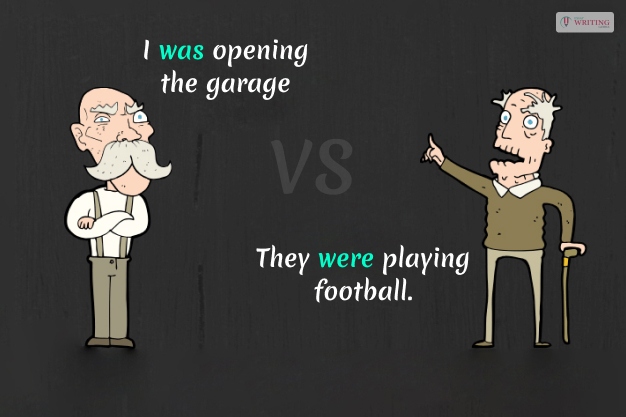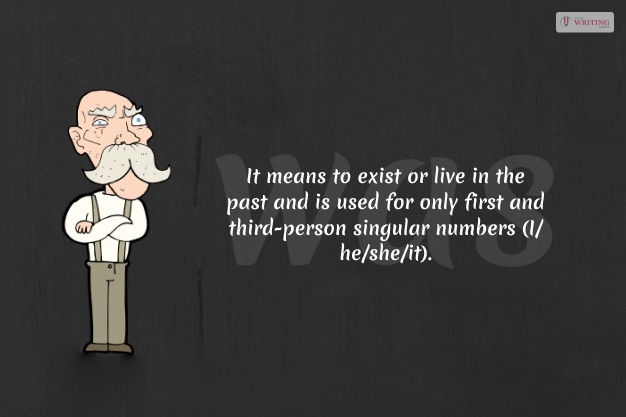To-be or not to-be? Was or were?
It seems like there is always a question regarding “to-be.” Many of us find it troublesome to use to-be in a sentence. The was vs were debate is one of the never-ending and long ones.
But it is ok to mess up your English. You can always learn and improve. Many of us know the meaning and use of two of these ‘to-be verbs. For example, ‘Was’ is the to-be verb for first and third-person singular past tense. On the other hand, “were’ is used for the second-person singular and plural number in the past tense.
But, there are some exceptional usages. For instance, “if I was a bird/ if I were a bird” – constructing these sentences makes the choice a little harder. But don’t worry; all the confusion will dissolve once you go through this article.
Was Vs Were: Let’s Spot The Difference

Before you understand the use cases, it is crucial to understand what ‘was’ and ‘were’ are and what makes them different. To simplify – both ‘was’ and ‘were’ are the two different forms of ‘to-be.’ But the difference here is set by two different factors.
- Factor 1: The person used by your verb (is it first person, second, or third person?)
- Factor 2: Is the verb in the past subjunctive or past indicative tense?
Past indicative is used when an objective statement is made, and past subjunctive sentence is used for hypothetical or imaginative statements or questions. When someone is making a past subjunctive statement, ‘were’ is always right ‘to-be to use. The following examples should be convincing –
- I were
- You were
- We were
- They were
- He/she/it were
But when you use was or were in the past indicative, the ‘to-be’ starts to depend upon the subject. For example –
- I was
- They were
- You were
- he/she/it were
Understanding the difference should be easy once you take the two factors discussed here into account. However, the usages of ‘was’ and ‘were’ may still be hard. You can read the examples and the process of using the ‘to-be’ below.
Read more: “Truely or Truly” – What is The Difference Between Truely and Truly?
Was Vs Were: When To Use Was?

‘Was’ is the past tense indicative of ‘to-be.’ It means to exist or live in the past and is used for only first and third-person singular numbers (I/he/she/it). The use of this form of ‘to-be usually means the existence of a person or occurrence of an event in the recent or distant past.
For example, if you went to school yesterday, you can use past indicative and construct sentences such as – I was at school yesterday. If you want to say the same about a third person, you can construct sentences such as – Jane was at school yesterday.
You can also use ‘was’ as an auxiliary in past continuous tense with a first/third person singular subject. For example –
- I was opening the garage.
- Johnny was bringing the wrench in his bag.
- She was singing a song by Taylor Swift.
Was Vs Were: When To Use Were?

The use of ‘were’ as a ‘to-be’ is applicable both in the past tense for third-person plural (we and they) or second-person subjects (you). The use case remains similar to the use of ‘was’ when used in past indicative.
For example –
- They were at school yesterday.
- You were at school yesterday.
The use case also remains the same when used in a past continuous sentence. For example –
- They were playing football.
- You were playing football.
But the use of ‘were’ in a sentence becomes a little different and difficult in the subjunctive mood. It is completely opposite to past indicative moods. Subjunctives are used for conditional or unreal, or imaginative. For example, when you are talking about your imagination or your dreams. You can also use the subjunctives to express something you wish to do. These intentions usually have little possibility of becoming a reality.
Some examples of the use of ‘were’ in the past subjunctives are as follow –
- If I were superman, I would fly to you right now.
- He took over the team as if he was the captain.
- Her mother scolded her as if she was a teenager.
Most of these confusions are usually solved better through examples. If you go through the examples I have provided, then you can easily understand the difference between was vs were. The differences are similar to awhile vs a while, which I have explained before.
Read more: Which One Is Correct: I Seen It or I Saw it? Seen vs Saw Examples
Was Vs Were: Which One To Use When?
Subjunctive expressions are not that extensive right now. We are not used to talking or writing the same way we used to centuries ago. Both language and expressions are changing by leaps and bounds. As far as I can tell, you will only require the indicative expression, for which the explanations given here should suffice. However, you can still use the subjunctive mood in your expression and follow the rules I have provided.
I think you have found a solution to your query. If there remains any query, the comment box is yours for the taking.
Read Also:
- Greatful or Grateful? Correct Spelling for your Thank You Note
- Bought vs brought | Know The Difference and When to Use Those words
- Is Correct to Say in Case? Know The Difference Between Incase or In case
